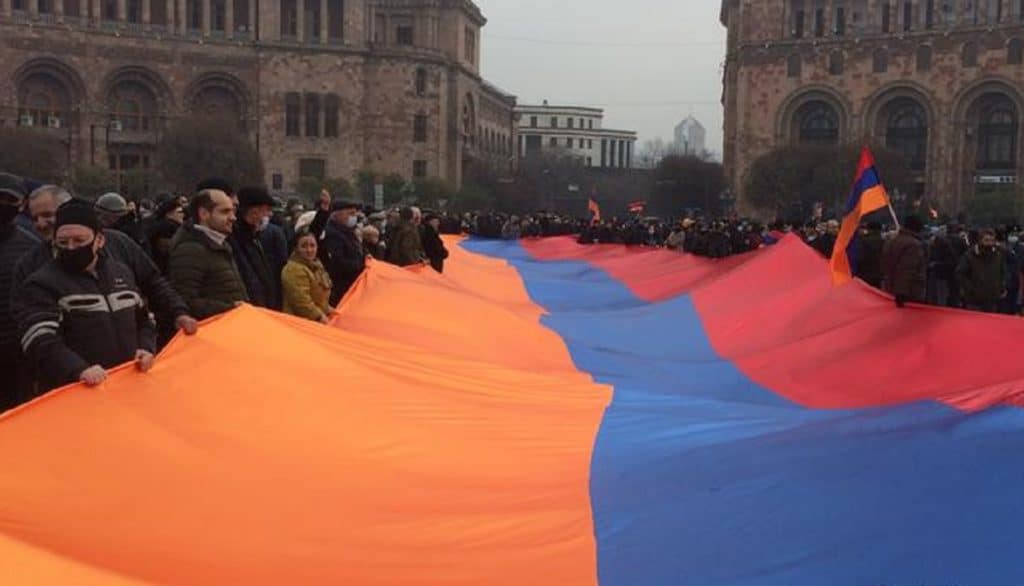By David Davidian
It has been said, “Give a man enough rope, and he will hang himself.”

During the immediate post-Soviet era, the West did its best to induce “cowboy, laisse-faire capitalism” within newly independent states where the majority never had a tradition of defending their sovereignty, never mind creating a Grand National Strategy where most of the societal, economic, and security infrastructure would be served. The Baltic States and Eastern European republics had some tradition, within memory, that could be relied on to a certain extent. Such was not the case with peoples and lands incorporated into the Soviet Union in its nascent years. One of those regions was the Transcaucasian Socialist Federative Soviet Republic, which formed the basis for the eventual Georgian, Armenian, and Azerbaijani Soviet Socialist Republics, each created in 1936. None of these three Soviet republics had much of a tradition of modern self-rule as a national institution.
At the dissolution of the Soviet Union, circa 1991, Georgia, possessing a long border with Russia, defined itself as a state that might parallel many of the ex-Warsaw pact countries in adopting a Western/NATO/EU ethos. Adoption was easier than trying to create an indigenous national ethos, especially when along with adoption came substantial financial incentives from the World Bank, IMF, and the EU. Georgian President Mikheil Saakashvili opened his doors to Turkish investments, hoping it would be a step closer to NATO membership. As a result, Georgia reaped the benefits of Western capital and significant NGO funding. However, also as a result, today Turkey weighs heavily on, if not controls, Georgia’s foreign policy.
Circa 1992, as Azerbaijan was still developing its Turkic character initiated a century earlier, was provided a shot of pan-Turkism personified by Abulfaz Elchibey, Azerbaijan’s second president. However, with hydrocarbon reserves, the Aliyev dynastic authoritarian government that followed could afford to inculcate a modern Turkish-inspired national ethos, much of it based on creating an existential enemy, the Armenians. This, of course, was in reaction to losing the first Karabakh War in the early 1990s. Azerbaijani hydrocarbon transport and reserves are supported by Western powers, mainly the UK, with nearly $70B invested by British Petroleum. In addition, Azerbaijan borders both Russia and Iran. The latter border geography has offered Azerbaijan an interesting relationship with Israel, with purported Israeli intelligence bases situated within Azerbaijan used against Iran. Azerbaijan can afford to pay handsomely for what it lacks in diplomatic acumen, including bribery in the EU and bought-off media, along with systemic money laundering.
Due to many cultural and social characteristics — the result of the Turkish genocide that emptied Asia Minor’s Armenian population and culture, immediately followed by Armenia’s remaining land forcibly incorporated into the Soviet Union – Soviet Armenia and the independent Armenia that evolved from it created a society whose skepticism is perhaps only matched by Israeli Jews. In society, the family was of primary importance, whereas the state within living memory was either genocidal or totalitarian. All three peoples of the region, Azerbaijanis, Georgians, and Armenians, had their local brand of corruption. Each country extracted whatever physical frameworks were possible from the Soviet state, especially as Glasnost and Perestroika opened the gates for individuals to indulge themselves in the accumulation of individual wealth.
Azerbaijan’s developing hydrocarbon infrastructure, mainly the BTC (Baku-Tbilisi-Ceyhan) pipeline running through Georgia into Turkey, and separate lines running to the Georgian and Russian Black Sea ports of Supsa and Novorossiysk, respectively, served the interests of gas-starved Europe. While Turkey, Azerbaijan, and Georgia became an intertwined political and financial energy knot, Armenia was left with Russia as its only patron.

The world view of post-Soviet Armenia’s leaders was that Armenia was incapable of achieving geopolitical parity with its Turkic neighbors, Turkey and Azerbaijan. Rather than use the diverse power, influence, and capabilities of the Armenian Diaspora (similar to what Israel does), the domestic agenda of these leaders was predicated on giving a free hand to Armenia’s first set of oligarchs. Rather than develop a Grand National Strategy for the country, these nouveau-riche individuals emptied factories of equipment, and highly trained people were either considered competition and/or were relieved of their duties. The brain-trust of the Armenian Diaspora was also considered competition. Their monetary contributions earmarked for national aid and development ended up embezzled. Entire generations of Diasporan Armenians were dismissed as non-entities just as local Armenians with highly-developed scientific skills were.
Loans from World Bank, IMF, and NGO funding were accepted by the Armenian authorities with zero transparency as to how the funds were used and what was expected in return. A typical scenario would feature an Armenian ministry that would be contacted by some foreign embassy situated in Armenia. The embassy would request that an economic or political policy in the interest of that foreign entity be carried out by the Armenian ministry and so it would be. For example, vegetable seeds for a particular local product would be given to the ministry along with a monetary “grant.” The minister would pocket the grant, and the seeds would be used to compete and eventually replace the local Armenian product. Those local natural sources that produced organic, better tasting, perhaps exportable products, have long since vanished, along with the minister who implemented the arrangement. While this pay-for-play tendency is common across the Third World, Armenia’s so-called leaders, with their non-transparent laisse-faire system, made these transactions particularly easy. We doubt France would allow a foreign competitor such as Italy to replace its grape seeds.
There is little difference between the ruling habits of oligarchs of Armenia and what passes for governance in Armenia. It should be no surprise that all major political parties have an oligarch or oligarch aspirant leading them. While there are laws against people with business interests serving as Members of Parliament (MP), transferring business ownership in Armenia to a family member is effortless. Many of these oligarchs and oligarch MPs don’t even try to hide their unattractive, Mafia-like street names.
The ethos that permeates Armenian society has resulted in a thirty-year period where wealth accumulation has become a national aspiration, and the supporting (or lack thereof) law-enforcement and governance infrastructure that maintains this existing condition is well understood. In many cases, society is comfortable with the existing system. While making a comfortable living is a laudable goal, the business ethics — established in the early ex-Soviet period which created wealthy oligarchs — were not based on any business discipline. It was much easier to plunder state resources than to establish a competitive environment and downplay existential threats to Armenian sovereignty.
In contrast, being an Armenian patriot (in its broadest sense) is barely tolerated by the ruling elites. Being a patriot does not bring an immediate cash flow, yet it is a general societal requirement to maintain national sovereignty. One might inaccurately compare such a sorry situation with the southern European countries where tax evasion is a national sport. However, in sharp contrast to Armenia, from Greece to Portugal, even states that condone tax evasion have an overall strategy that transcends local issues. There are enough institutions, be they judicial, diplomatic, educational, or industrial, which take each of these states in a particular national direction. One could argue that Western democracies are in name only, each of them, in actuality, are societies designed to serve a higher goal.
Many are invested in Armenia’s social and economic structure. Changing it requires a leaderless social shift in the status quo. The latter would be based on Armenian interests, emphasizing national security and the rule of law. These items have been taken captive by the current socio-economic arrangement. The rule of law is paramount as it will instill a sense of societal discipline and responsibility. If law enforcement is a matter of negotiation, starting with cheating in school to having personal contacts with influential people, such debilitating cultural traits will inevitably be reflected in national governance. Wars have been lost for less. Transparent institutions with checks and balances will self-correct themselves, leading to responsible governance. The cult of personalities must make their way to the cult of serving a Grand National Strategy.
Armenian elections are coming in mid-June, and twenty or so parties are vying for position. Unfortunately, the outcome for Armenia will produce little difference, unless of course replacing the current incompetence with cronies is considered progress, assuming the current ruling party is voted out. The policies that have resulted in a defeatist foreign policy, benign diplomacy, and little transparency will not change. There is an old Persian saying: “You can change the saddle, but the jackass is the same.”
How does one reconcile a statement made on May 17 by a ruling party MP, Vladimir Vardanyan, who on public TV stated, “Our army defends the people, not some deserted lands.” The term, “deserted lands” refer to both the Azerbaijan-occupied Armenian republic of Nagorno-Karabakh and the recent, alleged incursion of Azerbaijani troops 3.5 km into Armenia. This statement attempts to rationalize the loss of Nagoro-Karakah to Azerbaijan yet lacks the basic understanding of what constitutes a sovereign state. The statement appeals to certain strata of society just waiting to sign the first real estate and business contracts with both Turks and Azerbaijanis. This societal element overlooks what the resulting loss of Armenian sovereignty will actually mean in the short or long term. If the goal of accumulating wealth has replaced an Armenian Grand National Strategy, one cannot assume such is the case with Armenia’s neighbors to the east and west. Armenia is in a volatile region and has put itself in a precarious situation of military capitulation, soon to be followed by economic concessions. The loss of local business, farming, and distribution are never on Armenia’s public agenda. One need only look at the loss of the tomato market in neighboring Georgia to Turkish farmers. If Armenian governance served a Grand National Strategy, it would seek the best and brightest to fill necessary state functions. Worse, Armenia’s elites unambiguously don’t want the best and brightest as either one would disrupt the established order.
“Patron Davo,” Armenia’s top arms monopolist, arrested in early February on unclear charges, was released on May 17. Claims were made he “unduly” profited from his arms sales. How do we know what he sold to the Armenian military was top quality or even his choice, if his priority was to maximize his profits? We should not assume that his intentions were honorable.
A way out of Armenia’s myopic condition is not to create another political party but instead to establish cultural memes that put national security at the forefront of daily discourse. Such societal change is not in the interest of oligarchs, for it will constantly call into question the actions taken by governmental structures. Such societal changes would not be anti-oligarch per se, since the demand for anti-monopoly law enforcement would follow. Armenia, after all, claims to be a republic. In a republic, power is held by the people. Just because people cast ballots in a free election doesn’t mean democracy is served. Democracy comes with constant responsibility. It is not an end in itself. Transforming the system created in Armenia over the past generations will take great commitment and sacrifice if Armenia is to keep whatever semblance of sovereignty it has.
Yerevan, Armenia
Author: David Davidian (Lecturer at the American University of Armenia. He has spent over a decade in technical intelligence analysis at major high technology firms. He resides in Yerevan, Armenia).
(The views expressed in this article belong only to the author and do not necessarily reflect the editorial policy or views of World Geostrategic Insights).
Image Credit: Aschot Gazazyan/DW
Note: The last reference link is in Armenian. Google translate is suggested to read it in your preferred language.







